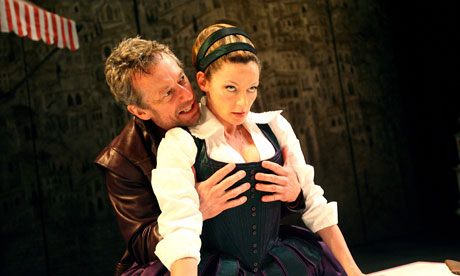A man acquires a rich but headstrong woman as his bride. At the wedding, he punches the priest and later refuses to attend the family party. He drags his bewildered wife through the mud to his country house, where he starves her, deprives her of sleep and contradicts every word she says. By the time they return to her father's home, the woman is meek and submissive.
When you strip The Taming of the Shrew of its comic sub-plot, in which a bevy of lovers in disguise woo a beauty, and focus on the bare bones of the story of wildcat Katherine and her "tamer" Petruchio, Shakespeare's early play looks like a nasty piece of work. Indeed, critics and academics have spent much of the past century denouncing it as barbarous, offensive and misogynistic. Yet Shrew is remarkably popular with audiences: the production opening in Stratford-upon-Avon this week is the Royal Shakespeare Company's third (fourth, if you count last year's for young audiences) in less than a decade. Either theatre-goers are secret sadists, who like nothing better than watching a spot of wife-bashing, or there's more to Shrew than meets the eye.
Over the past two decades, productions have divided into two camps. On one side, performances emphasise the brutality of Kate and Petruchio's relationship. In this interpretation, Shrew can be considered, in director Edward Hall's words, "theatre of cruelty". His all-male production in 2007, he says, "followed the text through to its bitterest conclusion. Look at what Shakespeare has written: Kate is starved of sleep, beaten, refused food." Too often, he argues, this abuse is played for laughs, when what should be being communicated is Kate's suffering.
Hall doesn't think Shakespeare was being misogynistic in portraying female subjugation, but questioning the values of society. "He's challenging an audience's expectations of how a woman is supposed to behave. What if, as a human being, she doesn't want to roll over, as was expected in Shakespeare's day? I actually think he's championing the woman's rights."
The other, less stomach-churning interpretation is that this is a curiously misunderstood love story. Lucy Bailey, who is directing the new RSC show, believes their attraction is instant, and what unfolds is "all foreplay to one event, which is to get these two people into bed". For this to work, Bailey says, Petruchio must never appear to be superior to Kate. "In rehearsals, the play quickly becomes odd if Petruchio starts to lecture, becomes the educator, or takes any moral position. It becomes punitive, and you start to think, 'This is dead and ghastly.' It is a fantastic battle of the sexes: it's because they won't allow each other to win that the game continues."
The trouble with the love-at-first-sight version is that it's hard to understand why Petruchio should mistreat Kate so. Gregory Doran, who directed the play for the RSC in 2003, suggests that Petruchio doesn't know how to handle their relationship because he is as much of an outcast as Katherine. He points out that both characters are frequently described as mad: "Madness is a way that society can label you. That's what Kate and Petruchio are struggling against. I don't think it's describing an ideal relationship, but it is a real relationship."
Director David Farr, whose 2002 staging shifted the setting to 1950s America, believes Shakespeare offers a key to Petruchio's mental imbalance by telling us his father has recently died. "Here is a man in grief," says Farr, "who takes out his disaffection and anger on other people almost as an experiment." That idea of experimenting is crucial to David Caves, playing Petruchio in Bailey's production. He sees Petruchio as a man whose pride is piqued by encountering a woman capable of outwitting him. "If he dishes something out to her, she dishes it back to him twice as bad. He's constantly having to improvise."
Nichola McAuliffe, who has played Katherine twice, believes we misread Petruchio's actions because we don't understand his references to falconry. When Petruchio says he will deny Katherine sleep and food, he is describing the way birds of prey are socialised, with owner and animal enduring the same deprivations. "If you know anything about falconry," she argues, "you would know that you have to go through this with the bird: if it's cruel, it's cruel to yourself, too." Sure enough, Shakespeare gives the impression that it is Petruchio keeping Katherine awake – and when she doesn't eat, he doesn't either.
There remains a difficulty in these "torture" scenes: Katherine barely speaks, whereas Petruchio never shuts up. According to Lisa Dillon, playing Katherine in Bailey's production, this contrasts with Katherine's long final speech (in which she advises wives to be gentle to their husbands), showing how much she has changed. "If you look at the language she uses, all the way into the second half, it's odd," says Dillon. "The verse is staccato, there's lots of saying 'What?' and 'Why?' You get the feeling nobody ever listens to her. Petruchio gives her the power of speech and language: he gives her freedom to speak. That is not a woman being crushed."
What's so appealing about the love interpretation is that Shrew becomes, not a soppy romance, but a subtle critique of society's attitudes to women, already changing in Shakespeare's time. Bailey and Dillon argue that Katherine is rescued by Petruchio: if she didn't marry him, says Dillon, "she would go from shrew to witch and end her days as a madwoman".
Kathryn Hunter, who played Katherine at the Globe in 2003, remembers how rankled she felt that "her father was going to marry her off after a single interview". For McAuliffe, too, it is the bartering of daughters that looks really misogynistic. In accordance with custom of the day, Katherine's father, Baptista, promises his two daughters to the men who have the most to offer financially. And, as a portrait of womanhood, spirited Katherine is preferable to her flirty, wily sister Bianca. "Bianca gives women a very bad name," says Michelle Gomez, who played Katherine for the RSC in 2008. "She is the manipulative, backstabbing, awful version of what women are, fluttering her eyelids to get what she wants."
One of the tenets of 20th-century feminism was that the personal is political. Perhaps what's so difficult for modern feminists is accepting that, in Shrew, the personal is just personal. Bailey says that Katherine's final speech, in which she declares herself ready to put her hand beneath her husband's foot, "is a love gift. Kate wouldn't behave like this if she were married to anyone else. It's wrong to mix it up with a weird sexual political statement: it's a personal statement."
McAuliffe adds: "That's basically what I say to my husband: I will put my hand under your foot if you want – but I trust you not to ask me to." Shrew, she says, is a warts-and-all portrait of a marriage: "You make room for each other, you fit their holes and they fit yours. Yes, they drive you potty – but that's between you two. You are a united front. That's what Kate and Petruchio learn. They are one person by the end."











